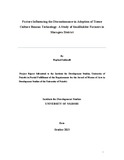| dc.description.abstract | Smallholder farmers in Kenya have been cultivating bananas among other crops such as
coffee since the pre-colonial times. Bananas before the 1980s were grown to provide rural
households with food. Unlike in other countries where banana is considered a typical export
crop, in Kenya banana is grown by peasant farmers for home consumption and for domestic
market. The Kenya Agricultural Research Institute (KARI) launched a tissue culture project
in 1996/97. Since there was a lack of clean planting materials, the main objective of this
project was to supply smallholder farmers with pathogen free materials, notably tc-plantlets.
Despite the earlier adoption, in 2008, a study by Mbaka et al. (2008) revealed that farmers
were discontinuing the technology and reverting to the old practice of obtaining suckers from
own orchard or neighbour field. In this regard, it was important to carry out a study and
establish why these farmers were discontinuing the technology and reverting to the use of
suckers despite the challenges that suckers hold. The specific objectives include: First, to
establish the characteristics of the discontinuing farmer; Second, to establish farmers’ reasons
for discontinuing the technology; Third, to find out from farmers the advantages of suckers
over tissue cultured plantlets and; Lastly, to analyse and establish the most important factors
which influence farmers’ discontinuance decision of tc-banana technology.
In terms of methodology, this study adopted a case study approach. Case study approach is
useful in investigating a contemporary phenomenon in its natural setting (Yin, 2003). This
approach was used in order to investigate the phenomenon of discontinuance amongst
smallholder banana farmers in Kenya. The main unit of analysis was the smallholder banana
farmer. This study was informed by both primary and secondary data. The research started by
reviewing relevant documents such as books, newspaper articles, web resources, brochures,
reports from various sources. Then, proceeded to collect primary data through the following
methods, namely: in-depth interviews, key-informant interviews and personal observation.
Two main sampling techniques were used namely: purposive and snowballing sampling. Data
was analysed both qualitatively and quantitatively. Whereas quantitative data collected
through interviews was cleaned, coded and analysed using the Statistical Package for Social
Sciences (SPSS), qualitative data was analysed through thematic analysis.
The study found that discontinuance decision is pegged on several factors. This study
however categorized the factors into two broad categories, namely: technical and socioeconomic
factors. On the one hand, technical factors include factors such as pests and
v
diseases, labour requirements of the cultivation of tc-bananas and costs of plantlets. On the
other hand, the socio-economic factors include factors such as access to credit and
information, poor infrastructure and access to markets. The study recommends that farmers
be educated to understand and appreciate the benefits of tissue culture technology as a tool
for crop propagation. It is also imperative that the potential risks or disadvantages associated
with this technology be communicated and carefully explained to the farmers. In this case,
the possibility of encountering problems should always be made clear. Without proper
communication and transparency, the potential of the technology to improve the lives of the
rural poor can be easily be lost. | en |

